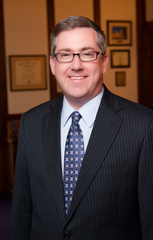October 31, 2014
Letter to the university from President Schulz

Dear Faculty and Staff,
Greetings from Anderson Hall! The leaves are falling from the trees and you can see your breath in the morning, which means it must be getting close to November. I am always amazed at how fast the semester seems to go. Thanksgiving is right around the corner, and if you remember my November 2012 letter, we might see a talking turkey again on campus.
Over the past month, Provost and Senior Vice President April Mason and I have had the opportunity to visit with the leadership teams in our colleges and similar units to discuss progress made toward K-State 2025 at the unit level. Additionally, we shared a presentation that details 2025 progress at the university level. These sessions are always fun as we get to visit with faculty and staff from across the university, share our successes and hear feedback and concerns.
During these presentations, we have discussed our collective success in private philanthropy and fundraising. I would note that the K-State 2025 plan is essential for our success in raising private funds. Without a strong vision of where we would like to go as a university, we would certainly not be raising such large amounts of money. At the end of the day, our university donors and supporters want to be part of something significant and help us achieve our goals and objectives.
Philanthropy is not magic. It is not putting massive pressure on anyone to give us money. It is not having a slick looking PowerPoint presentation, and it is not dependent on having a winning football team. Philanthropy is about building relationships, describing a shared vision for the future, and hearing about the influence K-State has had on someone's life. Ultimately, when a donor elects to give a gift to K-State it is because someone — a faculty or staff member — affected their life in a meaningful way while they were a student or connected to the university in some way.
Fundraising also is a team sport, and we have a large number of people who share in our successes. Each of our deans, along with many of our campus leaders, is expected to meet with K-State alumni and friends to build and develop relationships and share a vision for where K-State is going institutionally as well as the direction of their particular college. With half of our alumni living outside of Kansas, this means many of our deans are traveling frequently to meet with prospective supporters. Most of fundraising is not actually asking for money, but instead is describing our successes and those areas where additional funds can make a significant difference in moving K-State forward.
We are fortunate to have a team of seasoned fundraising professionals at the KSU Foundation working jointly with the academic community to put excellent projects and opportunities in front of prospective donors. As president, I have had the opportunity to travel and work with many of our front-line fundraisers. They are very dedicated to helping us achieve our goals as we seek to become recognized as a Top 50 public research university.
During my time as president, I have placed a strong emphasis on private philanthropy and its importance to our future. In five years, we have more than doubled the amount of funds we raise annually. In 2009, our fundraising total was $82 million, compared to $211 million for 2014.
So, how much is $211 million?
- If we stacked $1 bills on top of each other, it would stand 14.3 miles high.
- If we placed $1 bills end-to-end, it would reach 82 percent around the earth at the equator.
- If we put all of these $1 bills into a truck, it would weigh approximately 232 tons.
Any way you look at it, this is a significant investment in Kansas State University by more than 50,000 different individuals who contributed to K-State last year.
As part of the $211 million cumulative fundraising figure, many of our units had record fundraising years as well. Here are final figures for the past year for selected units.
Alumni Association: $1.7 million
Agriculture: $14.5 million
Architecture, Planning & Design: $6.8 million
Arts & Sciences: $12.3 million
Beach Museum of Art: $370,000
Business Administration: $40.4 million
Education: $2.2 million
Engineering: $12.5 million
Graduate School: $130,000
Human Ecology: $3.0 million
Intercollegiate Athletics: $58.5 million
K-State Olathe: $240,000
K-State Salina: $10 million
Libraries: $310,000
McCain: $165,000
Office of Diversity: $110,000
Office of International Programs: $104,000
Staley School of Leadership Studies: $4.7 million
Veterinary Medicine: $5.1 million
General university — non-scholarship: $28.2 million
Presidential and general scholarship – unrestricted: $6.0 million
So, who will be the major benefactors of Kansas State University in the year 2050? It will be the many students that each and every one of you influences, whether it is in your classes, as an advisor, student organization sponsor or as supervisor of their undergraduate research. In short, our 2050 benefactors will be those YOU are inspiring now at K-State!
Good luck in November and December as we wrap up the fall semester. Two final reminders: Please remember to share your voice via the University Climate Survey to make K-State an even better place to work and learn, and get out and vote for the candidates of your choice on Nov. 4.
Go 'Cats!
Kirk
